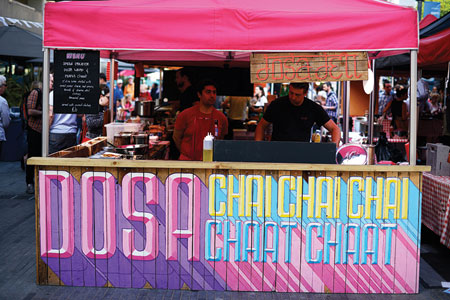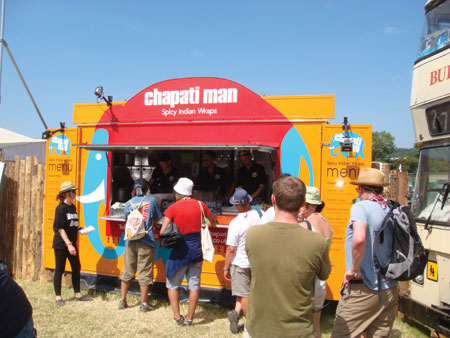Festivals of food
Summer is here and so is the UK's legendary line-up of festivals. But music lovers aren't only picking events based on their performers any more; the food offerings, which now range from Middle Eastern to mac ‘n' cheese, are just as important, as Elly Earls reports
The festival spirit is in the air. Glastonbury has wrapped up after showcasing acts as diverse as Dolly Parton and Metallica, Wireless and Latitude are just round
the corner, and August will host V Festival, Reading and SW4 among many others. But this year exhausted festivalgoers trundling home aren't just emembering incredible performances; they're looking forward to the next time they can sample an authentic Vietnamese noodle dish or tuck into a North African tagine that could have come straight from the streets of Morocco.
"Food at music festivals has been improving year on year for several years now. In order to get into the festivals, new traders had to offer something different to get recognised by the events, and so the offerings are becoming ever more diverse," says Mark Laurie, director of the Nationwide Caterers Association
(NCASS).
"It probably started over a decade ago; however, it has really taken root in the past two to three years and you can now find food from every corner of the earth. In fact, quite often the options available are considerably more diverse than you would find on your local high street."
Petra Barran, founder of London-based street food organisation Kerb Food, agreesthat there are now almost endless options for festivalgoers. "Among our traders who do festivals you'll get wood-fired pizza, Indianspiced wraps, the best mac 'n' cheese, dosas, octopus curry, gyoza and more. But it's not
just our traders who are upping their game; festivals are now getting some amazing food traders that are outside London," she says.
Indeed, the arrival of the street food industry in the UK and consumers' obvious enthusiasm for it has spurred on even the traditional event caterers. "As new people have come into the industry with new ideas and food concepts, many of the more established event traders have upped their game to remain competitive, so although you will still find burger vans, fish and chips or hot dogs, closer inspection may reveal rare-breed meats, local sourcing, sustainable fish or 'haute dogs'," Laurie says.
Shifting the balance
Overall, the balance has shifted from predominantly fast-food trailers to an equal mix of traditional festival fare and artisan offerings, Laurie believes. "I don't think the fast-food trailers are doomed though; there is certainly space in the market for both," he says. "Not everyone wants or has the budget for high-end food. The nice thing is that people now have the choice. It reflects the changing food scene across the UK."
Value for money is absolutely key for successful festival traders, emphasise Laurie and Barran. "Although the economy is recovering, many of the punters at music festivals are still under 25 - one of the groups most affected by the downturn," Laurie says.
"Those customers are likely to be more price-sensitive; however, perceived value also has a part to play in this. While youngsters might have tight budgets, they may see a more expensive, yet better quality or more nutritious offering as better value than a cheaper fast-food option."
Barran adds: "Customers don't want to feel short-changed. If your price doesn't reflect the size of your portion, customers won't come back. People only really eat three times a day at festivals, so they need filling up!"
The sustainability factor
Local sourcing and sustainability are also increasingly high on festivalgoers' priority list. "Studies have been conducted into the desire for more sustainable options, locally sourced, organic food and so on, and have shown that many music festivalgoers do rank sustainability as important," Laurie says.
"Just because someone is happy to live in a tent for three days, it doesn't necessarily mean that they want to spend three days eating burgers, or in the case of vegetarians or vegans, three days of veggie burgers."
Meeting the needs of such a discerning clientele, when traders are limited by everything from the weather to the electricity supply, as well as the number of customers who turn up, isn't easy. And the latter, for Laurie, is one of the key issues.
"You are relying on event organisers getting the right number of traders in for thenumber of punters at the event," he explains.
"And, when organisers overstate ticket sales or bring in too many caterers, it becomes very difficult to break even, let alone make a profit, so traders must be aware of what they are signing up to and must be prepared to negotiate over price and even turn down events that are over-catered or undersold."
According to Alan Wiggett, managing director of Express Cafés, the largest mobile caterer in the UK, whose clients include Reading and V Festivals, building a good relationship with event organisers is essential to overcome these, as well as the other challenges presented by festival catering.
"We always work closely with our clients to ensure we provide a balanced food offer, while also ensuring that commercially the offer works for everyone concerned," he says, adding that getting the right staff can also be tricky, particularly when the weather is poor. But only if you don't sell it right.
"The biggest benefit for staff working at a festival is that they get to enjoy the festival atmosphere and see some good music," Wiggett says."It always amazes me how resilient young people are. They just get on with it - never mind if the site is knee-deep in mud and they have been camping for three days and nights."
Looking to the future, Laurie is convinced this is only the beginning of a new era for festival catering. "Without doubt, we really are in the midst of a good food revolution in the UK at the moment," he adds. "People are looking for inspiration from all over the world, but they are also exploring traditional British food and traditional cooking methods. Things that have perhaps been forgotten over time are now inspiring cooks and chefs up and down the country."
Restaurateurs popping up at festivals It's not just event caterers and street food traders that can help festival organisers draw in the foodie crowds; traditional
restaurateurs are popping up at festivals, too. Latitude, for example, will play host to the Rotary Bar & Diner pop-up by the Rushmore Group, where customers can enjoy a full sit-down lunch or dinner complete with chairs, tables, knives, forks, chilled wine, pint-sized cocktails and even a DJ.
But if you're thinking of following suit, Mark Laurie, director of the Nationwide Caterers Association (NCASS), advises getting in touch with NCASS first. "If you do not have the equipment and resources to manage it, the costs could prove prohibitive," he warns. "You have to approach it very differently to a restaurant. You should have a far more limited menu and different ways of pulling in punters - and you can't rely on drinks sales to keep you profitable."
The challenges don't stop there. "You will also be working ridiculously long hours in often difficult conditions, such as mud, rainand wind. And there are significant risks with regards to gas safety," he says. "Just like any business, you have to understand the risks to the public and your staff."
Laurie adds that the most common - yet misguided - assumption made is that because a trader is charging £6 for a burger, they are making an obscene profit.
"There are many variables, not least pitch fees, which affect profitability," he explains, adding that, despite the challenges, many restaurants do run successful event catering businesses, but only if they have a good understanding of the differences between the two types of businesses.
Chapati Man
After spotting a gap in the catering market, Chapati Man Chris Rai hit the festival scene in 2007 with his spicy Indian wraps and colourful trailer design, winning the Best Food award at Glastonbury in his first year of trading.
"Me and Andrea [Rai's wife and co-founder of Chapati Man] used to go to music festivals as punters for years, and we spotted a niche in the market," he says.
"We realised times were changing and festivalgoers wanted something different, authentic and with more quality to it than burgers and chips. Festival organisers knew this too, so they saw Chapati Man as a breath of fresh air in 2007. The food was becoming just as important as the music."
Since then, the festival catering industry has been hot on the Rais' heels, and Rai admits it is getting more difficult to stand out.
"Mobile catering has changed considerably over the past seven years," he says. "Costs are increasing each year, which is not easy, and there are a lot more bespoke types of unit and caterers who have emerged. It keeps you on your toes!"
Moorish Cuisine
Kada Bendaha, founder of Moorish Cuisine, is now a mainstay on the festival circuit, catering at events including Glastonbury, Womad and Bestival. He started out in festival catering about 11 years ago when he got the chance to share a tent with a paella trader at the Big Chill and got an incredible response.
He hasn't looked back. As well as catering for the hungry crowds at some of the biggest festivals around the UK, Bendaha now runs a delivery business in Leeds, operates a permanent stall - Café Moor, at the city's Kirkgate Market - and has a street food pop-up at Leeds Trinity Kitchen, a street food dining concept that opened in shopping centre Trinity Leeds last year.
His offering certainly hasn't stayed static over the years. "Every four years or so, the food scene evolves and what was exciting isn't exciting for people any more," he says. "That's why I created Café Moor in Leeds market, which serves Middle Eastern food with ancient recipes, rather than copying the same menu everyone else does. We wanted to make Middle Eastern recipes healthier and more exciting for people - something they could eat for lunch, not just after a night out."
So does he prefer festival catering or his new permanent outpost? "Festivals are a great window; a great learning process," he says. "People nowadays come not just for the performers and the music, they come for the food as well. You can be at the heart of what's going on in the country in terms of both music and food."
When it came to his stall in Leeds, Bendaha wanted to share what he'd learned with the people at home. "We wanted to try and offer something in Leeds of the experience we get in the summer," he explains. "It's great to be a kind of leader in Leeds - leading the industry of street food and having people appreciate what you're bringing them. To be honest, I don't know which I prefer."









